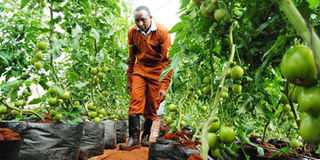Africa’s ecosystems have solutions to setbacks

A farmer inspects his tomatoes in his greenhouse on his farm in Mathakwa-ini in Tetu, Nyeri on March 31, 2016. PHOTO | BONIFACE MWANGI | NATION MEDIA GROUP
What you need to know:
- The establishment of the Ecosystem Based Adaptation for Food Security Assembly in 2015 during the United Nations Environment Programme's second food security conference was hatched to foster these partnerships.
- It is a solutions space that bridges gaps in financing, in policy processes, in techniques, in technology among others to achieve implementation through fostering linkages between solution providers along the entire agro-value chains.
Recently, the United Nations and the African Union launched the Ecosystem Based Adaptation for Food Security Assembly (Ebafosa) in Kenya, with the aim of boosting food security and leveraging the strength of partnerships to enable the continent to overcome some of its challenges.
Africa’s food security has become an issue of concern. The United Nations Food and Agriculture Organisation says some 240 million citizens go to bed hungry daily, while another estimated 200 million suffer from malnutrition, leading to 50 per cent infant mortality.
According to the final report of the 1996 World Food Summit, “food security exists when all people, at all times, have physical and economic access to sufficient, safe and nutritious food to meet their dietary needs and food preferences for an active and healthy life”.
If we are to go with that definition, then even Kenya, which is rated as East African largest economy and the 5th largest in sub Saharan Africa, does not pass the test, since a third of its population has no access to this vital need at the base of the pyramid.
Among reasons for Africa’s inability to feed its people are its degraded ecosystems, costing it $68 billion annually and post-harvest losses, which account for $48bn.
On the other hand, the continent’s population continues to soar, currently hitting the one billion mark, 200 million of whom are youth, most of them jobless. This figure is projected to double by 2045.
Climate change has not made things any better and agriculture, the single most important source of livelihood for 60 per cent of the total population in the region, is at stake.
The paradox is that Africa is endowed, not only with natural resources, but also with manpower and ideas.
With 65 per cent of the world’s arable land and 10 per cent of renewable water resources, the continent’s agro-value chain is projected to be worth an estimated $1trillion by 2030, capable of creating millions of jobs for the unemployed especially the youth.
CONTINENTAL BLUEPRINTS
Africa’s wealth in ideas is epitomised in the continental blueprints on development that it has been able to establish. Among the policy frameworks that it contributed to in 2015, were the Addis Ababa Action Agenda in June, the Sustainable Development Goals in September and the Paris Conference of the Parties in December, 2015.
Previously were the Malabo and Maputo declarations, which have yielded little success in that so far, only seven out of 53 African countries have met or surpassed the target of spending 10 per cent of GDP in agriculture development, 10 years into the decision.
These frameworks and policies look good but the Achilles Heel is implementation, hence the need for a paradigm shift.
Towards this approach, the UN and AU, together with other partners, strongly propagate the harnessing of two ecosystems: the Ecosystems Based Adaptation in agriculture and second, the Ecosystems of People and Professions.
EBA approaches emphasise working with nature, not against it, and communities harness available resources in nature to ensure maximum productivity of crops. The ecosystems of people and professions leverages the strength of partnerships.
The establishment of Ebafosa in 2015 during the United Nations Environment Programme's second food security conference was hatched to foster these partnerships.
It is a solutions space that bridges gaps in financing, in policy processes, in techniques, in technology among others to achieve implementation through fostering linkages between solution providers along the entire agro-value chains.
Florence Kadenge is vice-president (women), Ecosystem Based Adaptation for Food Security Assembly; the views expressed here are her own; Twitter: @fkadenge1; [email protected].





